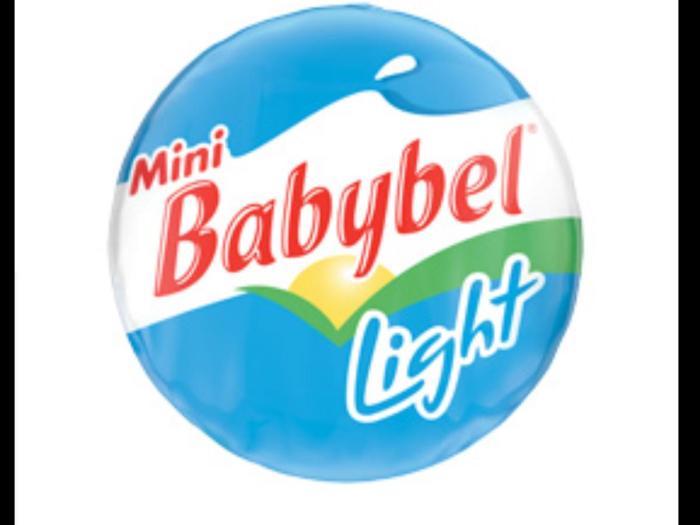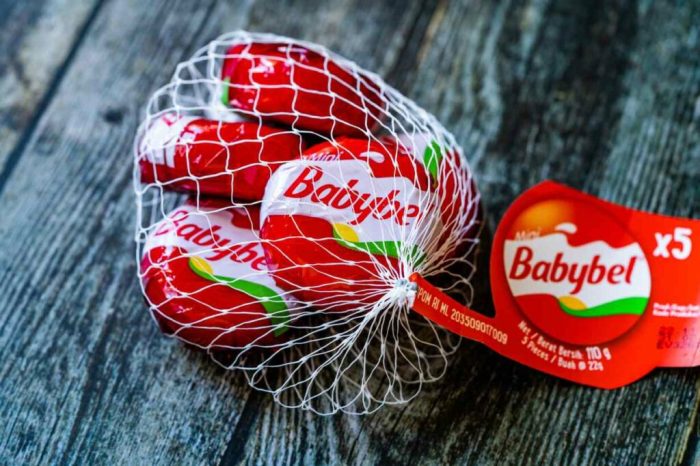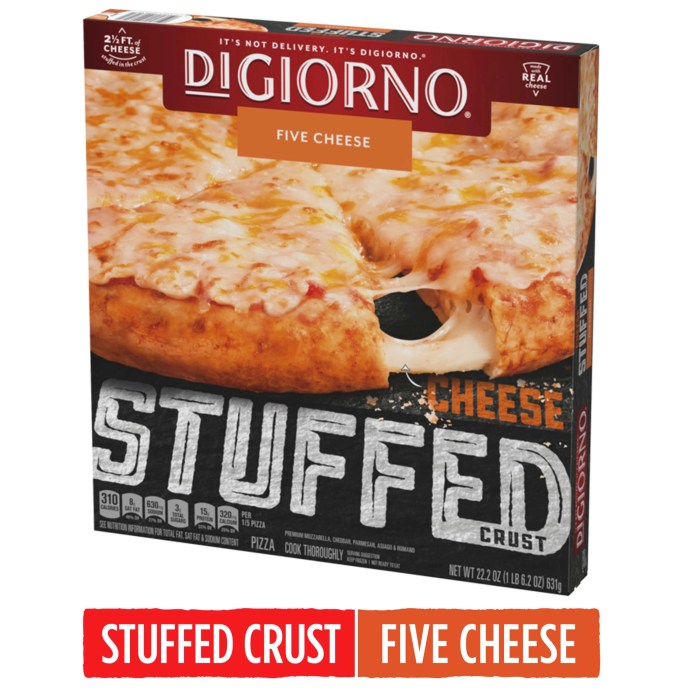Nutritional Composition of Mini Babybel Cheese: Mini Babybel Cheese Nutrition Facts
Mini babybel cheese nutrition facts – Mini Babybel cheese offers a convenient and tasty snack, but understanding its nutritional profile is key to incorporating it into a balanced diet. This section provides a detailed breakdown of the macronutrients and micronutrients found in a single serving of Mini Babybel cheese, along with information on added ingredients. Note that nutritional values can vary slightly depending on the specific flavor and production batch.
Macronutrient Composition, Mini babybel cheese nutrition facts
Mini Babybel cheese is primarily composed of fat, protein, and carbohydrates. The exact amounts vary slightly depending on the flavor, but a typical 28g Mini Babybel provides a substantial amount of protein and fat, while remaining relatively low in carbohydrates. The fat content is largely composed of saturated and unsaturated fats, which contribute to the cheese’s creamy texture and rich flavor.
Understanding mini Babybel cheese nutrition facts is crucial for mindful snacking. While Babybel offers a convenient portion size, comparing its nutritional profile to other cheeses, like the readily available shredded mozzarella cheese nutrition , can provide valuable context. Knowing the fat and protein content of both helps you make informed choices about your daily dairy intake, ultimately impacting your overall mini Babybel cheese nutrition facts understanding.
| Nutrient | Amount per serving (approx. 28g) |
|---|---|
| Fat (Total) | 7g-8g |
| Saturated Fat | 5g-6g |
| Unsaturated Fat | 2g-3g |
| Protein | 6g-7g |
| Carbohydrate | 0.5g-1g |
Micronutrient Content
Beyond macronutrients, Mini Babybel cheese provides several essential vitamins and minerals. These contribute to overall health and well-being. The cheese is a particularly good source of calcium, crucial for bone health, and vitamin B12, essential for nerve function and red blood cell formation.
| Nutrient | Amount per serving (approx. 28g) (Approximate values – may vary) |
|---|---|
| Calcium | 150mg – 200mg |
| Vitamin B12 | 0.5mcg – 1mcg |
| Vitamin A | Variable, depending on type |
| Phosphorus | Variable, depending on type |
| Vitamin D | Often added, amounts vary |
Added Ingredients
Mini Babybel cheese typically contains milk, salt, cultures, and sometimes enzymes. The amount of salt can vary depending on the flavor. While some varieties may include additional ingredients such as colorings or preservatives, these are generally minimal. Consumers are encouraged to check the ingredient list on the specific packaging for detailed information.
Mini Babybel Cheese vs. Other Cheeses

Mini Babybel cheese offers a convenient and appealing snack option, but how does its nutritional profile stack up against other popular cheese choices? Comparing Mini Babybel to other cheeses allows for a more informed decision when selecting dairy products as part of a balanced diet. This comparison will focus on key nutritional aspects, including fat, protein, calcium, and sodium content.
Understanding the nutritional differences between various cheese types is crucial for making informed dietary choices. Factors such as milk type, aging process, and manufacturing techniques all influence the final nutritional composition. This comparison will highlight the variations and help consumers make the best selection for their individual needs.
Nutritional Comparison of Mini Babybel, Cheddar, Mozzarella, and Swiss Cheese
The following table presents a comparative analysis of the nutritional content per serving (approximately 1 ounce) of Mini Babybel, cheddar, mozzarella, and Swiss cheeses. Note that values can vary slightly depending on the brand and specific type of cheese. These values represent average figures based on readily available nutritional data.
| Cheese Type | Fat (g) | Protein (g) | Calcium (mg) | Sodium (mg) |
|---|---|---|---|---|
| Mini Babybel | 7-8 | 6-7 | 200-220 | 150-180 |
| Cheddar | 9-11 | 7-8 | 200-250 | 170-220 |
| Mozzarella | 8-10 | 6-7 | 180-220 | 140-180 |
| Swiss | 28-30 | 7-8 | 270-300 | 100-150 |
As the table illustrates, Mini Babybel cheese generally falls within a moderate range for fat, protein, and calcium content compared to other popular cheeses. While cheddar has a slightly higher fat content, the protein and calcium levels are comparable. Mozzarella presents a similar profile to Mini Babybel. Swiss cheese stands out with a significantly higher fat content but also boasts higher calcium levels.
Sodium Content Comparison Across Cheese Types
Sodium content is a crucial consideration for individuals managing blood pressure or sodium intake. As seen in the table above, the sodium content of Mini Babybel cheese is comparable to cheddar and mozzarella, while Swiss cheese tends to have slightly lower sodium levels. It is important to remember that portion size significantly impacts overall sodium consumption.
Choosing cheeses with lower sodium content can contribute to a healthier diet, especially for those sensitive to high sodium intake. Always check the nutrition label to make informed choices.
Nutritional Advantages and Disadvantages of Mini Babybel Cheese
Mini Babybel’s individual portion size contributes to portion control, making it a convenient option for snacking. Its relatively balanced nutritional profile offers a good source of protein and calcium. However, the fat content, while moderate, might be a consideration for individuals following a low-fat diet. The sodium content, while not exceptionally high, should also be considered as part of a balanced daily intake.
Ultimately, the nutritional advantages and disadvantages of Mini Babybel cheese depend on individual dietary needs and preferences. It’s a good option for those seeking a convenient source of protein and calcium, but it’s essential to be mindful of its fat and sodium content within the context of a balanced diet.
Dietary Considerations and Mini Babybel Cheese

Mini Babybel cheese, with its convenient size and appealing taste, presents a unique consideration for individuals managing various dietary needs. Understanding its nutritional profile is crucial for determining its suitability within specific dietary plans. This section explores the compatibility of Mini Babybel cheese with different diets and its potential impact on overall health.
Suitability for Various Diets
Mini Babybel cheese’s suitability varies across different dietary approaches. The following points detail its place within common dietary plans:
- Low-Fat Diets: While Mini Babybel cheese offers a good source of protein and calcium, its fat content might be a concern for individuals strictly adhering to a low-fat diet. The fat content varies slightly depending on the specific variety, but it’s generally moderate. Careful portion control is recommended for those limiting fat intake.
- Low-Sodium Diets: The sodium content in Mini Babybel cheese is relatively moderate compared to some processed cheeses. However, individuals on very low-sodium diets should check the nutrition label carefully and consider portion size to manage their sodium intake effectively. Those with hypertension or other sodium-sensitive conditions may need to limit their consumption.
- Ketogenic Diets: Mini Babybel cheese can be a suitable addition to a ketogenic diet due to its relatively high fat content and low carbohydrate count. The fat provides a good source of energy consistent with the ketogenic approach. However, individual daily carbohydrate limits should be considered.
- Vegetarian Diets: Mini Babybel cheese is naturally suitable for vegetarians as it is a dairy product and contains no animal products beyond milk.
Impact on Cholesterol Levels
Mini Babybel cheese, like other cheeses, contains saturated fat, which can potentially raise LDL (“bad”) cholesterol levels. The amount of saturated fat varies slightly across different Mini Babybel varieties. Individuals with high cholesterol or a family history of heart disease should monitor their intake of saturated fat from all sources, including Mini Babybel cheese, and consult with their healthcare provider or a registered dietitian for personalized dietary advice.
A balanced diet rich in fruits, vegetables, and whole grains, along with regular exercise, is crucial for managing cholesterol levels.
Role in a Balanced Diet
Mini Babybel cheese can contribute to a balanced diet by providing protein, calcium, and other essential nutrients. However, it’s important to remember that it’s a high-calorie and relatively high-fat food. Incorporating it as part of a balanced meal plan that includes a variety of fruits, vegetables, whole grains, and lean protein sources is key. Portion control is essential to prevent excessive calorie and fat intake.
For example, a single Mini Babybel cheese could be paired with a piece of fruit and a small handful of nuts as a balanced snack.
Frequently Asked Questions
Are Mini Babybels suitable for lactose-intolerant individuals?
No, Mini Babybels contain lactose and are therefore unsuitable for individuals with lactose intolerance. Symptoms may vary, but generally include digestive discomfort.
How does the nutritional content of Mini Babybel cheese change during storage?
Proper storage (refrigeration) helps maintain the nutritional content, but some degradation may occur over time. The longer it’s stored, the more susceptible it is to changes in texture and flavor, potentially impacting its nutritional profile.
Are there organic or grass-fed options available?
While standard Mini Babybels are not typically organic or made from grass-fed milk, some retailers may carry variations that meet these criteria. Check product labels carefully.


